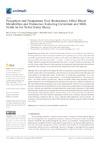Identificador persistente para citar o vincular este elemento:
https://accedacris.ulpgc.es/jspui/handle/10553/107067
| Campo DC | Valor | idioma |
|---|---|---|
| dc.contributor.author | Zarrin, Mousa | en_US |
| dc.contributor.author | Sanginabadi, Meysam | en_US |
| dc.contributor.author | Nouri, Mahrokh | en_US |
| dc.contributor.author | Ahmadpour, Amir | en_US |
| dc.contributor.author | Hernández Castellano, Lorenzo Enrique | en_US |
| dc.date.accessioned | 2021-04-30T10:44:06Z | - |
| dc.date.available | 2021-04-30T10:44:06Z | - |
| dc.date.issued | 2021 | en_US |
| dc.identifier.issn | 2076-2615 | en_US |
| dc.identifier.uri | https://accedacris.ulpgc.es/handle/10553/107067 | - |
| dc.description.abstract | This study aimed to investigate the effect of prepartum and postpartum feed restriction on body weight (BW), blood metabolites, and hormones as well as colostrum and milk yields and compositions in fat-tailed dairy sheep. In this study, 20 multiparous and pregnant ewes were randomly allocated to either the control (Ctrl; n = 10) or the feed-restricted (FR; n = 10) groups from week −5 to week 5 relative to parturition. Despite dry matter intake being decreased in the FR group compared to the Ctrl throughout both prepartum and postpartum periods, no differences in BW were detected between groups in any of the studied periods. Feed restriction increased both free fatty acids and beta-hydroxybutyrate concentrations during both prepartum and postpartum periods. Similarly, feed restriction increased triglyceride concentration postpartum. Additionally, feed restriction increased insulin and growth hormone and decreased prolactin concentrations during both prepartum and postpartum periods. Feed restriction caused a decreased colostrum yield and a relative increase of the main colostrum components in the FR group. Similarly, milk yield decreased in the FR group compared to the Ctrl group, although milk components were not affected. In conclusion, feed restriction did not affect BW but decreased colostrum and milk yield in fat-tailed dairy sheep | en_US |
| dc.language | eng | en_US |
| dc.relation.ispartof | Animals | en_US |
| dc.source | Animals [EISSN 2076-2615], v. 11 (5), 1258 | en_US |
| dc.subject | 3104 Producción Animal | en_US |
| dc.subject | 310906 Nutrición | en_US |
| dc.subject.other | Ewe | en_US |
| dc.subject.other | Mammary gland | en_US |
| dc.subject.other | Metabolism | en_US |
| dc.subject.other | Parturition | en_US |
| dc.title | Prepartum and Postpartum Feed Restrictions Affect Blood Metabolites and Hormones Reducing Colostrum and Milk Yields in Fat-Tailed Dairy Sheep | en_US |
| dc.type | info:eu-repo/semantics/article | en_US |
| dc.identifier.doi | 10.3390/ani11051258 | en_US |
| dc.identifier.issue | 5 | - |
| dc.investigacion | Ciencias de la Salud | en_US |
| dc.type2 | Artículo | en_US |
| dc.utils.revision | Sí | en_US |
| dc.identifier.ulpgc | Sí | en_US |
| dc.contributor.buulpgc | BU-VET | en_US |
| dc.description.sjr | 0,61 | |
| dc.description.jcr | 3,231 | |
| dc.description.sjrq | Q1 | |
| dc.description.jcrq | Q1 | |
| dc.description.scie | SCIE | |
| dc.description.miaricds | 10,5 | |
| item.fulltext | Con texto completo | - |
| item.grantfulltext | open | - |
| crisitem.author.dept | GIR IUSA-ONEHEALTH 4. Producción y Biotecnología Animal | - |
| crisitem.author.dept | IU de Sanidad Animal y Seguridad Alimentaria | - |
| crisitem.author.dept | Departamento de Patología Animal, Producción Animal, Bromatología y Tecnología de Los Alimentos | - |
| crisitem.author.orcid | 0000-0003-2729-0434 | - |
| crisitem.author.parentorg | IU de Sanidad Animal y Seguridad Alimentaria | - |
| crisitem.author.fullName | Hernández Castellano, Lorenzo Enrique | - |
| Colección: | Artículos | |
Citas de WEB OF SCIENCETM
Citations
11
actualizado el 25-ene-2026
Visitas
273
actualizado el 15-ene-2026
Descargas
259
actualizado el 15-ene-2026
Google ScholarTM
Verifica
Altmetric
Comparte
Exporta metadatos
Los elementos en ULPGC accedaCRIS están protegidos por derechos de autor con todos los derechos reservados, a menos que se indique lo contrario.
